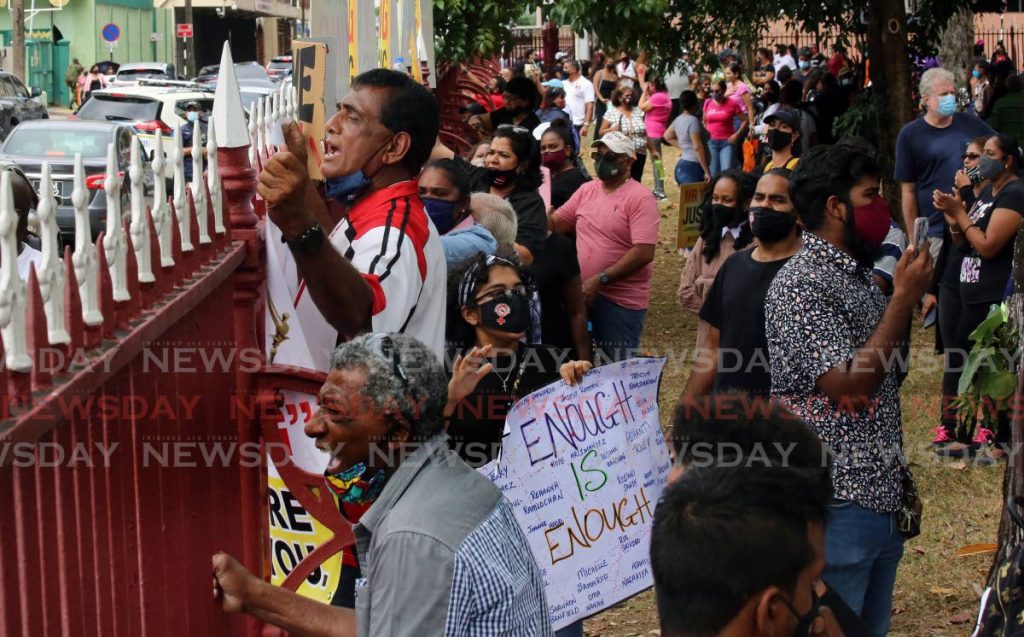The creation of a regional joint policy by the Caribbean Employers’ Confederation (CEC) and the Caribbean Congress of Labour (CCL) to address gender-based violence (GBV) in the workplace is just the beginning. Implementation will require the changing of deeply ingrained cultural values across the Caribbean.
Organisation presidents Wayne Chen and Andre Lewis, respectively, made similar statements at the virtual signing of the policy, facilitated by the Cipriani College of Labour & Co-Operative Studies. The positions are an expansion of the UNFPA’s Spotlight Initiative, where Caribbean employers and labour unions will collaborate to address gender-based violence at the workplace level.
Chen said the two organisations began working on the policy documents on April 6, and with the assistance of the college had held two workshops on May 18 and June 8 with 47 companies and 50 labour union representatives across 18 Caribbean countries to develop and finalise the policies.
“The policy will serve as a guide for employers to address GBV at two levels: primary prevention by informing employers and employees what GBV looks like, so it can be prevented before it occurs, and secondary prevention by protecting and/or reducing the risk of exposure to violence against women and girls (VAWAG).”
He said the CEC pledged to promote the adoption and distribution of the policy across its 14 member states.
“We still have some distance to go in making the policy truly incorporated into the mindsets of our leaders, employers and workers. Before this year ends the CEC will continue to raise awareness of the policy through an engaging online campaign, which will heighten awareness of GBV and encourage behaviour change across the region. There will also be regional training that will achieve national employers’ associations to achieve this goal. This policy is just the beginning, committed not only to shaping workplace policy but to changing workplace culture and engender a zero-tolerance approach to GBV.”
UNFPA Caribbean sub-regional liaison Aurora Noguera-Ramkissoon said the Spotlight Initiative focuses on the specific type of GBV that is most prevalent in a particular region.
“Globally we know that 1 in 3 women will experience GBV in their lives worldwide. In the Caribbean, recent studies published by UN Women note that there’s an average lifetime prevalence of intimate partner violence of 45 per cent, with significant risk for women who are victims of domestic abuse being killed by intimate partners or family members. As such in the Caribbean the focus of the Spotlight Initiative has been on family violence.
“We recognise that the workplace is an important and strategic place to disrupt GBV. Why the workplace? Most people spend at least eight hours at work, so violence at home can be compounded when there is a lack of supporting structures in the workplace and there is an environment of harassment or inequality.”
She said the same report said over 75 per cent of the adults in counselling at the Rape Crisis Society for incidents of sexual violence have not filed a report.
“Many people accessing counselling have never gone to court or filed a report, many don’t want to go through the process or feel ashamed. This speaks to key role of labour unions and employers in creating safe zones in the workplace for sharing prevention information but also information for where survivors can obtain services.
“These joint policy positions challenge behaviours that foster these harmful practices, creating environments where survivors feel supported, and equipped with information and tools to seek guidance and support. They provide an essential framework to ensure that anyone experiencing GBV, abuse, and harassment in the workplace, has greater access to coordinated support, including special leave, anonymous reporting, confidentiality and employee assistance programmes.”
Lewis said signing of the position signified the CCL’s commitment to fight GBV in the workplace, the home, and the wider community. He said the policy covered all workers, including those who might be discriminated against for their sexual orientation.
“Any worker who is being abused, the unions have to support them. What we have to recognise is that the challenge won’t be solved overnight but we have given the commitment to engage the wider community, from the point of view of labour, through our shop steward system, our engagement with our workers, constant reminders, constant workshops, constant reminders and re-examinations and explanations of the goals.”
Chen said the CEC was moving towards the development of a toolbox to assist its members in implementing the steps listed in the policy.
“Recognising that what is fairly straightforward for a bigger organisation is more difficult for small and medium organisations, where the vast majority of our workers are employed. I’m talking about the sensitivity of trust within an organisation. When someone is experiencing GBV, who do they speak to? Is it a trusted person, a confidential person, a person sensitive to the issue, and once they have made the report, is it handled in an objective and impartial way that recognises the confidentiality and severity of the issue? Right now, we’re not there, and we have some real work to do to raise the sensitivity of the issue, within organisations and at the national level.”
